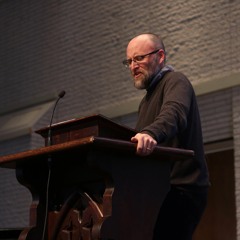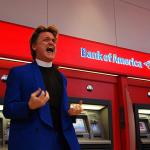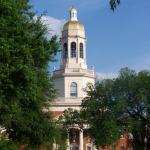I have becoming increasingly convinced that the preservation of a functioning democracy in which human rights are respected and civil discourse across the political spectrum is encouraged should be one of the most important priorities for American evangelical Christians. Yet too often, evangelical Christians are divided themselves about the value of civil discourse and democratic norms, with some openly rejecting these virtues.

I’ve written elsewhere about why American evangelicals should care about the health of our democracy, but I was delighted to hear Jay Green, a professor of history at Covenant College (and former president of the Conference on Faith and History), not only express similar sentiments but also combine his exhortation with an analysis of current political divisions among American evangelicals. As Jay suggests, disagreements about the means that we use in achieving political goals may be even more important than differences in opinion about the goals themselves.
I first encountered Jay’s analysis in his address at the Lee Symposium, a small annual gathering of Christian academics that takes place at Lee University in Cleveland, Tennessee. Yesterday Jay published an edited version of that address in Current.

Because of my interest in Jay’s analysis, I’m devoting my Anxious Bench post today to an interview with Jay about the argument that he presented at the Lee Symposium.
DW: In your address at the Lee Symposium, you said that traditionally, we have thought of political divisions among evangelicals (and among Americans in general) extending along a left-to-right continuum, but that today there’s another more important division that cuts across the traditional left-right spectrum. That division relates primarily to strategy, rather than mere values. Can you describe that division and explain why it’s important?
JG: Yes, we ordinarily think of American Christians as being divided over the public goals they hold for American society, which we often refer to as debates over “values.” In order to avoid confusing (and increasingly meaningless) “left vs. right” language, I have labeled this continuum of Christian public aspirations, “Emancipatory” vs. “Civilizational.” The former category emphasizes the hope that the state will ensure liberty for all in the pursuit of a just, flourishing, pluralistic society. Emancipatory Christians aren’t interested in the state giving special treatment to Christians or Christian priorities, per se. They herald the rise of racial justice, gender equality, and other contemporary movements of liberation as important steps toward realizing what they see as broadly Christian goals of a justice and freedom.
Civilizational Christians, on the other hand, are inclined to think the state should back policies and laws broadly supportive of the Judeo-Christian principles and priorities, which they see as foundational to the American system. They don’t necessarily support the suppression of freedoms for other groups, but they do presume the underlying Christian character of American ideals and institutions. Recent social developments—the sexual revolution, the rise of abortion-on-demand and no-fault divorce, and the normalization of LGBTQ lifestyles—are evidence of the nation’s precipitous decline and reasons for lament. In this light, Civilizational Christians since the 1960s have promoted goals of “restoration” and “return.”
This peculiar dynamic has fueled what James Davison Hunter labeled the American culture wars, which have been raging since the 1960s. We have grown accustomed to defining differences among Christians roughly along these lines. I don’t disagree with this assessment. However, within each group I have observed a rapidly growing segment who advocate their respective public goals without regard to the moderating principles of liberalism—freedom of speech, liberty of conscience, tolerance of difference, and the rule of law. The goals remain much the same, but the procedures for achieving them increasingly adopt a more radical “whatever it takes to win” posture. Illiberal impulses in each group make every public debate a zero-sum game and, as a result, fill our public discourse with ever greater rage and the looming threat of violence. All that remains is a will to power and groups that believe it increasingly necessary to achieve their goals at any cost.
DW: If we accept your premise that a division over strategy cuts across divisions over ideology, we can divide evangelical political attitudes into four quadrants. Can you describe each of those quadrants and tell us a little bit about what institutions or groups of people might be in each of these quadrants?
JG: Starting from the traditional Emancipatory vs. Civilizational division, I label those in each camp that remain bound by the commitments of liberalism, Minimalists. And those who have lost faith in liberal principles and procedures, Maximalists. So that leaves us with four groups, one in each quadrant:
- Civilizational Minimalists see the goal of Christian engagement in public life as supporting policies that will allow the nation to develop its underlying Judeo Christian values within the framework of the liberal Constitutional system. These are what we once called “social conservatives,” who believe in personal freedom, small government, free markets, and traditional values. While Civilizational Minimalists have broadly Christian public goals and believe the state should with them in carrying them forward, they are not pursuing aggressive government action with its thumb on the scales for Christians. Writers like Marvin Olasky and Robert George, and organizations like the Ethics and Public Policy Center and the Acton Institute fit in this group.
- Emancipatory Minimalists hold comparable views, though with decidedly different emphases. They believe that the goal of Christian action in public life is to preserve freedom and equality of every person regardless of race, ethnicity, religious persuasion, or gender. Their efforts are likewise bound by liberalism (free speech, free markets, individual rights), viewing it as the best way to ensure such civil rights and liberties for all—Christians included. They presume that America is and should be comprised of a rich tapestry of cultural backgrounds and lifestyles (including those to which Christians might personally object). Civilizational ambitions are inconsistent with the founding, but they are also futile because we already live in an intensely pluralistic society. Writers like David French and Karen Swallow Prior, and publications like Christianity Today fit in this group.
- Emancipatory Maximalists are known most widely by their critics as Woke Christians, or, less generously, the “Woke Mob.” Their convictions seem rooted in many of the features of traditional liberalism, with its emphasis on civil liberties, personal rights, and cultural diversity. But they have largely abandoned the procedural niceties of liberalism in exchange for a hardened visions of identity politics and formal activism. They emphasize America’s long history of racism, sexism, and homophobia, but see these impulses not as poisonous forces that have thrived despite Christianity and the liberal order, but as implicit dimensions of American life because of Christianity and the liberal order – or, at least, because of the white patriarchal version of Christianity that they think has long characterized American evangelicalism. Liberalism, they often claim, has been the tool of straight, white, cisgender male Christians to keep the marginalized marginalized. Writers like Jemar Tisby and Kristin Kobes Du Mez, and publications like Red-Letter Christians and Sojourners largely align with this group.
- Civilizational Maximalists believe that Christians involved in public life must do “whatever it takes” to return American society to its status as a religious civilization marked by Christian virtue. Like the Emancipatory Maximalists, they have lost faith in the value of liberal procedures and principles. If Emancipatory Maximalists consider liberalism an historic harbor of white privilege and exploitative capitalism, Civilizational Maximalists consider it to be a weak and an inherently compromised system that opened the door to radical ideologies that are undermining the institutions and structures of civilization. They often express an almost primal rage at what they view as runaway leftist radicals who have “stolen” their country, trampled their values, and now threaten the future of their children. Originally coined as a category of criticism, Civilizational Maximalists have increasingly come to embrace the label “Christian Nationalist.” Figures from Eric Metaxas to Charlie Kirk, Megan Basham to John MacArthur, and publications from The Federalist and First Things to The Daily Caller and The Daily Wire align with this group.
DW: You described two of the quadrants as “bound by commitments to liberalism.” What do you mean by “liberalism” in this context? What type of “liberal commitments” do you think both progressives and conservatives should affirm?
JG: Liberalism is a confusing and highly contested term. For many conservatives, it has become synonymous with “progressive,” “leftist,” and even “Woke.” That’s not at all my intent.
I am using the term to signify something closer to “classical liberalism.” It comprises that constellation of ideals that underwrite the American founding: freedom of speech, religion, press, assembly, and petition, along with liberty of conscience, tolerance of difference, the illuminating power of dissent, and the hope of incremental change through public debate, persuasion, and compromise.
Of course, none of these ideals amounts to much without institutional commitments and social norms that uphold and reward citizenship under the rule of law. Regardless of their public goals, I believe Christians should submit to the principles and procedures of liberalism to achieve them.
DW: At what point do you think significant numbers of American evangelicals began rejecting the liberal norms that you describe? Why did they do so? And what are the consequences of doing so?
JG: There are a number of theories floating about that speculate on this question. Some believe that evangelicals (especially the Civilizational Maximalists) were never truly committed to the principles of liberalism. They have historically given formal lip service to its principles—especially when they held large majorities and wielded social power—but practiced authoritarian rule, suppressing dissent at every turn. David Sehat’s The Myth of American Religious Freedom makes a pretty compelling case for this perspective. I am not cynical enough to think that evangelicals have never genuinely committed themselves to the tenets of liberalism, though I do believe their diminishing access to social power has led to a rising authoritarian (“whatever it takes”) mindset. It’s easy to affirm liberalism when you hold the levers of power or trust those who do, and just as easy to abandon it when those levers of power feel out of reach.
To the degree that evangelicals understand that they have lost the culture war and have no meaningful standing among—and, in fact, stand in stark opposition to—the major institutions of cultural influence (journalism, higher education, “big tech,” television, film, and corporate boardrooms), many wonder if there remains any virtue in continuing to submit to a system that they have so many times heard described as “rigged.” Those who continue to uphold such values are increasingly seen either as suckers or in league with the “enemies of the faith.”
DW: You describe yourself as an “emancipatory minimalist” (and I probably would, too), but you teach at an institution that includes significant numbers of civilizational minimalists, at least in other departments. We are both part of professional circles that include people that you might describe as “emancipatory maximalists,” and if you’re like me, you might be part of church circles that include at least a few “civilizational maximalists.” How do you as a Christian, a historian, and an American who cares about democracy relate to people in each of these other quadrants? What would you encourage other “emancipatory minimalists” to do to advance the commitments to liberalism that they hold without resorting to the wrong sort of tactics?
JG: One of the reasons I pursued this back-of-the-napkin project of remapping contemporary Christian discourse was to understand the various encounters I am apt to have as a member both of an evangelical church (among some Christian nationalists) and the contemporary academy (among a great many “Woke” activists). I find myself defending and criticizing both groups depending on which set of friends I am at that moment engaging. Both sides have legitimate grievances. Neither feels that its peculiar priorities receive adequate recognition. The most important insight I have gleaned from this exercise is that liberalism isn’t simply a helpful framework for debates like these. It is essential for the health of our republic!
Prior to the election of Donald Trump, I naively took the institutions and ideals of liberalism for granted. And, as such, I didn’t pay much attention to public procedures and strategies for achieving goals that I considered worthy. If I found myself in agreement with the “ends,” I didn’t give a lot of thought to the “means.” Worries about the size and scope of the state didn’t worry me a lot, especially if I liked the people running things. The underlying sturdiness of the American system never seemed in doubt. In fact, I never gave it too much thought.
Four years of life under a president who didn’t understand the American system, and actively worked to undermine it, led me to reexamine my careless assumptions. I often say that the Trump presidency made me MORE not LESS conservative, if by “conservative” one means more consciously attentive to the founding principles of the nation.
Emancipationists and Civilizationists both identify genuine problems within American society, and both offer legitimate critiques of the excesses of “the other side.” Depending on which side of bed I get out of in the morning, and which particular set of concerns one or the other is raising, I am likely to find one or the other account of our collective struggles (or both) compelling. But, in the end, if we hope to maintain a peaceable, orderly, and flourishing social order, the goals espoused on both sides are going to rely on healthy, functional institutions and norms of liberalism to solve; the very institutions and norms the extremists on both sides continue to remain hellbent on destroying.
DW: Why should Christians care about liberal democratic norms? Why should a commitment to liberal democracy be more than a strategy for us? What Christian principles are at stake in our choice of political tactics?
JG: I think there are practical and principled reasons we should care about these liberal norms. For one, they protect all of us. One need only peer over to authoritarian regimes like China and Russia to see what it looks like to live in a world without the protections of liberalism. That Civilizational Maximalists like Rod Dreher find such “promise” in illiberal models such as Viktor Orban’s Hungary should make all of us shudder.
But there are more foundational reasons we should commit ourselves to liberal democratic norms. I believe that our commitment to liberalism as believers enables us to conform our public practices to the most elemental features of Christian theology. Ideas such as universal human dignity, openness to outsiders, liberty of conscience, the rule of law, and unalienable rights are deeply rooted in the ancient wisdom of the Old and New Testaments. And when we defend these hallmarks of the liberal tradition, we are upholding some of the most treasured features of our faith.
DW: What can American evangelical Christians do to preserve liberal democratic norms at this particular moment in our country’s political history?
JG: There is a dangerous tendency among evangelicals (left and right) to lean into the “radical” nature of the Christian faith. “Jesus was a revolutionary!” many proclaim. This instinct gives fuel to the so-called “higher” cultural aims of Christianity, whether it is “social justice,” on one hand, or “public righteousness” on the other, the implications for civic peace and social order be damned. When we become uncompromising as Christians in our social aims, anything is possible. We must resist the urge to think of politics in a pluralistic society in the stark categories of “good” and evil” as if it had to be a zero-sum game.
And we need to rediscover a vocabulary of liberalism that tolerates difference, celebrates compromise, and finds satisfaction in slow, incremental, uneven change. If we don’t, it is hard to see how we avoid paving a road to increased civil unrest—even violence.
To the degree that the liberalism draws from some of the deepest insights of historic Christian theology, I would love to see Christians take the lead in reaffirming its values and modeling its best practices. We need to start within our own homes and churches. May God help us.













